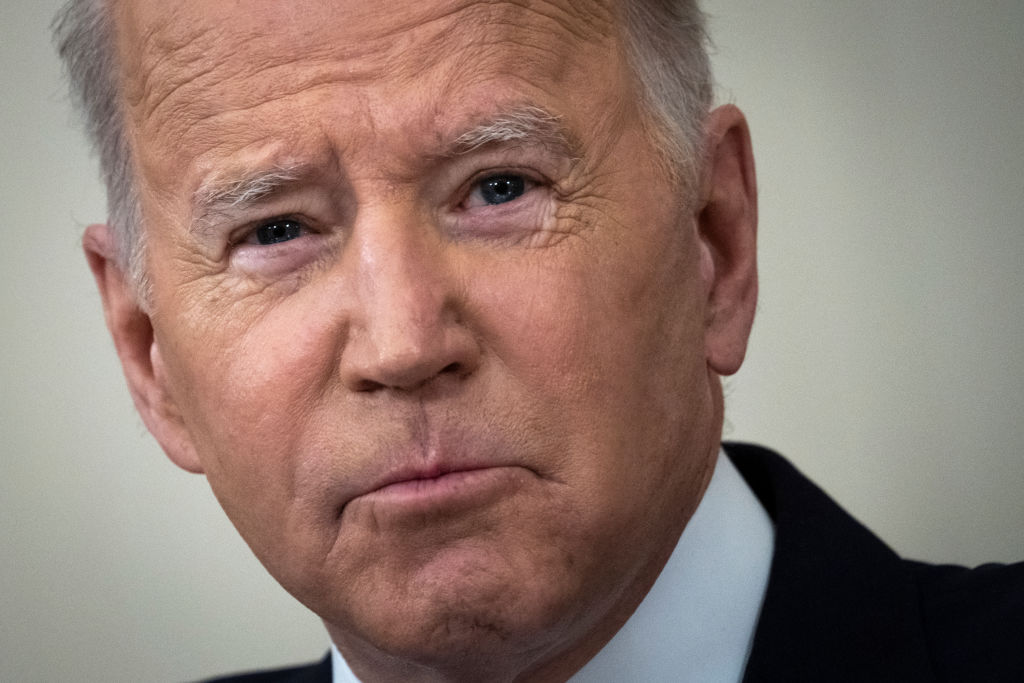Normalcy 2.0
Normalcy, as casual observers of the 2020 election will know, is a popular proposition. A new poll reaffirms the American people’s hunger for getting back to they way things were. According to a Monmouth survey published Monday, 70 percent of Americans agree that “it’s time to accept that Covid is here to stay and we just need to get on with our lives.” Among Republicans, 89 percent agree with the statement. Among independents, the figure is 71 percent. And among Democrats, it is 47 percent.
On one level, the Biden administration appears to sense which way the wind is blowing. Omicron was met with panicked resignation in the White House. And free tests and masks feel like a token nod to the pandemic from an administration that knows it will fail on its promise to “crush” the virus.
But dropping his this-is-an-emergency mindset is not the same thing as Biden ushering in a return to normal. In a world of abundant and effective vaccines, a less dangerous variant, widespread pandemic fatigue and ongoing economic, social and health costs from our response to the virus, the administration will have to go further if it wants to be genuinely pro-normalcy. It should be proactively encouraging people, especially those who are vaccinated, to live their lives. It should side with parents worried at the cost to their children of never-ending mask mandates. It should push for a scaled-back set of rules that govern those who test positive or had a close contact to someone with Covid.
Rather than deferring to, if not genuflecting before, overcautious public health officials, the White House should spoil for a fight with their hardcore elements. And rather than hiding from the virus at home (reportedly fearing that a positive test would give his political opponents a win), Biden should paint the town redder than the expected midterm results map. Biden would be well-served by a forceful, enthusiastic embrace of normalcy, albeit one that involves a higher case rate than he promised. (After all, who else are the Covid hawks going to vote for?) Yet I feel reasonably confident in predicting that he’ll do no such thing.
*** Sign up to receive the DC Diary in your inbox on weekdays ***
An increasingly united West
The Biden administration has reason to feel tentatively pleased with their diplomatic efforts over the Ukraine crisis in recent days. America delivered a forceful denunciation of Russian actions at the UN Security Council yesterday, backing up its firm line with preparations for troop deployments to Eastern European NATO member-states and arms supplies to Ukraine. Meanwhile, US and European allies appear to be growing more, not less, united in the face of Russian aggression.
As the Atlantic Council’s Daniel Fried puts it, “European views vary, as always, and some European governments (especially Germany) are visibly divided. But Europe has agreed to strong statements, both of its own and through NATO. The West may not be as divided as some fear — and as Putin hopes.”
Here in Washington, the terms of the domestic debate have narrowed, with analysts, advisers and legislators concerned with the specifics of sanctions, joint statements and NATO troop movements. That increasingly specific, detailed discussion should not disguise the high-stakes of the current confrontation, not only for Eastern European security, but for the future of US foreign policy.
“The current crisis over Ukraine is not only an opportunity for the United States to reassess its relationship with Russia in the aftermath of the costly wars in the Middle East and the challenges in East Asia,” writes Leon Hadar for the site. “It’s a chance for the US to draw the outlines of a new and coherent grand strategy that would determine the role America would play in the world today.”
For some, including Hadar, that means a pared-back role in Europe. Those who argue that Russia is a dangerous distraction from the century-defining threat from China tend to agree. While those more worried about Russia deny that the trade-offs between taking a tough line on Russia and doing the same thing with China are as stark as some claim.
But on one thing, all of these camps can agree: the need for Europe to take more responsibility for its own defense. And here too, the signs are encouraging. While there has been a notable lack of EU-based security cooperation during this crisis, a mix of supranational and bilateral arrangements have emerged. The most recent, expected to formally announced any day now, is a trilateral alliance between the UK, Poland and Ukraine.
Encouraging signs, but, as Fried points out, “The major tests are yet to come, however. Putin may yet start a general war with Ukraine.”
Jen Psaki’s alternate universe
In a recent appearance on Pod Save America, the insufferably smug Obama-bro podcast, White House press secretary Jen Psaki wanted to demonstrate the way in which different news outlets present different versions of reality. To do so, she read the chyrons on different cable news channels on screens in her West Wing office. After listing the topics leading the news on CNN (Ukraine), MSNBC (Ukraine) and CNBC (the market), she alighted on Fox News.
“And then, on Fox is Jeanine Pirro taking about ‘soft-on-crime consequences,’” Psaki said. Laughing, she continued: “I mean, what does that even mean, right? So, there’s just an alternate universe on some coverage. What’s scary about it is, a lot of people watch that.”
“They think that the president isn’t doing anything to address people’s safety in New York and that couldn’t be further from the truth,” she added.
After two years of rising violent crime rates and calls from Democrats in cities across America, who, here, is living in an alternative universe and who has a firm grip on reality? The answer is not what Psaki thinks it is. Again and again, the White House appears to treat violent crime as little more than a Republican talking point. Is it any wonder Democrats aren’t trusted to deal with this lethal and growing problem?
What you should be reading today
Freddy Gray: Are Kamala Harris’s days as VP numbered?
Teresa Mull: I sold my soul to a cosmetics store
Jonathan Bydlak: Don’t renew the child tax credit
The Editors, Washington Examiner: The BLM scam
Ben Hubbard and Amy Qin, New York Times: As the US pulls back from the Mideast, China leans in
Charles Fain Lehman, Wall Street Journal: Summer jobs reduce crime
Poll watch
President Biden Job Approval
Approve: 41.6 percent
Disapprove: 54.5 percent
Net approval: -12.9 (RCP Average)
Political television shows that viewers think best represent politics today
House of Cards: 18 percent
The West Wing: 15 percent
Madam Secretary: 12 percent
Scandal: 10 percent
Parks and Recreation: 7 percent
Veep: 6 percent(Echelon Insights)


















